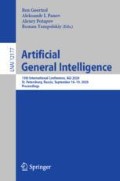Abstract
The videogame platform Teleport created earlier allows us to study anonymous social interactions among actors of various nature: human and virtual actor, ensuring their indistinguishability, which implies believable behavior of a virtual actor. The present study found a connection between the human player behavior in the Teleport game and her psychological portrait constructed using the sixteen-factor Catell personality test for empathy. Assuming that this connection is extendable to perception of virtual actor behavior, the game sessions data was analyzed to infer behavioral characteristics of virtual actors. Based on this data analysis, we constructed psychological characteristics of models of a virtual actor (a bot). Partner and emotional characteristics of bots were defined, and their psychological portrait was constructed based on the registered bot behavior. Personal characteristics such as courage, sociability, calmness, balance, and loyalty were attributed to bots and compared to analogous characteristics of human players.
Access this chapter
Tax calculation will be finalised at checkout
Purchases are for personal use only
References
Adams, S., et al.: Mapping the landscape of human-level artificial general intelligence. AI Magazine 33(1), 25–42 (2012)
Azarnov, D.A., Chubarov, A.A., Samsonovich, A.V.: Virtual actor with social-emotional intelligence. Procedia Comput. Sci. 123, 76–85 (2018). https://doi.org/10.1016/j.procs.2018.01.013
Chubarov, A.A., Tikhomirova, D.V., Shirshova, A.V., Veselov, N.O., Samsonovich, A.V.: Virtual Listener: A Turing-like test for behavioral believability. Procedia Comput. Sci. 169, 892–899 (2020). https://doi.org/10.1016/j.procs.2020.02.146
Ilyin, E.P.: Emotions and Feelings. Second Edition (Russian). Piter, St. Petersburg (2007)
Kapustina, A.N.: Multivariate Personal Method of R. Catell (Russian). Speech, St. Petersburg (2004)
Karson, W., O’Dell, J.W.: A Guide to the Clinical Use of the 16PF. University of Michigan Press, Ann Arbor (1976)
Korukonda, A.R.: Taking stock of Turing test: a review, analysis, and appraisal of issues surrounding thinking machines. Int. J. Hum Comput Stud. 58, 240–257 (2003)
Mueller, S.T.: A partial implementation of the BICA cognitive decathlon using the psychology experiment building language (PEBL). Int. J. Mach. Consciousness 2(2), 273–288 (2010). https://doi.org/10.1142/S1793843010000497
Nass, C., Steuer, J., Tauber, E.R.: Computers are social actors. In: Adelson, B., Dumais, S., Olson, J. (eds.). Proceedings of the CHI’94 Conference on Human Factors in Computing Systems, pp. 72–78, ACM Press, New York (1994). ISBN: 978-020176557-1
Raygorodsky, D.Ya.: Practical psychodiagnostics. Methods and tests (Russian). Bakhrakh-M Publication, Moscow (2011)
Samsonovich, A.V.: On the semantic map as a key component in socially-emotional BICA. Biol. Inspired Cogn. Archi. 23, 1–6 (2018a)
Samsonovich, A.V.: Schema formalism for the common model of cognition. Biol. Inspired Cogn. Archi. 26, 1–19 (2018b)
Samsonovich, A.V.: Emotional biologically inspired cognitive architecture. Biol. Inspired Cogn. Archi. 6, 109–125 (2013)
Samsonovich, A.V., Ascoli, G.A., De Jong, K.A.: Human-level psychometrics for cognitive architectures. In: Smith, L., Sporns, O., Yu, C., Gasser, M., Breazeal, C., Deak, G., Weng, J. (eds.) Fifth International Conference on Development and Learning ICDL 2006. Bloomington, IN, 2006: Department of Psychological and Brain Sciences, Indiana University. CD-ROM (2006). ISBN 0-9786456-0-X
Tikhomirova, D.V., Chubarov, A.A., Samsonovich, A.V.: Empirical and modeling study of emotional state dynamics in social videogame paradigms. Cogn. Syst. Res. 60, 44–56 (2020)
Acknowledgements
This research was funded by the Russian Science Foundation Grant No. 18-11-00336. The authors are grateful to all NRNU MEPhI students who participated in the study, and to all anonymous Reviewers for their useful comments on the manuscript.
Author information
Authors and Affiliations
Corresponding author
Editor information
Editors and Affiliations
Rights and permissions
Copyright information
© 2020 Springer Nature Switzerland AG
About this paper
Cite this paper
Tikhomirova, D.V., Zavrajnova, M.V., Rodkina, E.A., Musayeva, Y., Samsonovich, A.V. (2020). Psychological Portrait of a Virtual Agent in the Teleport Game Paradigm. In: Goertzel, B., Panov, A., Potapov, A., Yampolskiy, R. (eds) Artificial General Intelligence. AGI 2020. Lecture Notes in Computer Science(), vol 12177. Springer, Cham. https://doi.org/10.1007/978-3-030-52152-3_35
Download citation
DOI: https://doi.org/10.1007/978-3-030-52152-3_35
Published:
Publisher Name: Springer, Cham
Print ISBN: 978-3-030-52151-6
Online ISBN: 978-3-030-52152-3
eBook Packages: Computer ScienceComputer Science (R0)

